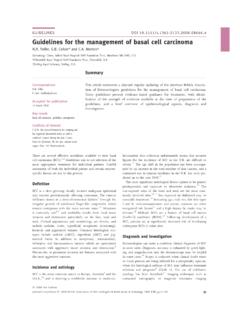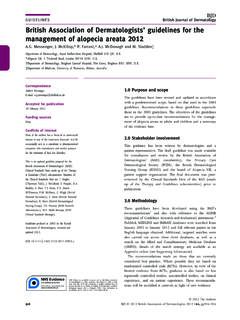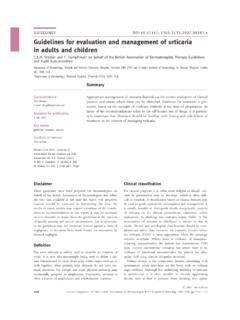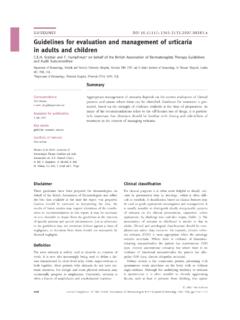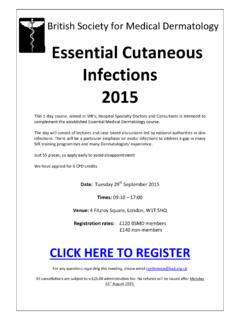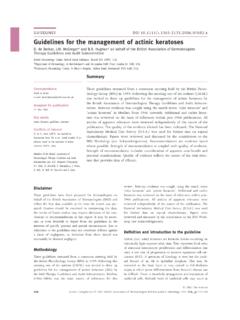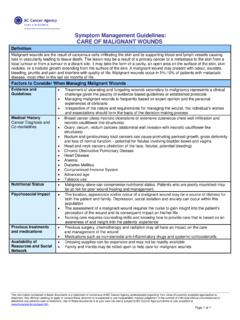Transcription of Dermatology
1 2 SpecialtiesDermatologyDermatologyNickJLe vellMDFRCPMBAC onsultantdermatologistStephenKJonesMDFRC PC onsultantdermatologistChristopherBBunker MDFRCPC onsultantdermatologist1 DescriptionofthespecialtyDermatologists are the only experienced, trained andaccredited specialists in the diagnosis and managementof diseases of the skin, hair and nails in adults andchildren. There are no others who can provide care ofequal quality to that of dermatologists; however, thereare only 650 consultant dermatologists in the UK, manyof whom work part time. Over 2,000 skin disorders arerecognised, so accurate diagnosis is fundamental tosuccessful management. Each year 54% of thepopulation are affected by skin disease, and 23 33% atany one time have disease that would benefit frommedical ,2 Approximately 4,000 deaths occur inthe UK annually due to skin disease, most often frommalignant diseases represent 34% ofdisease in children,2with atopic eczema affecting 20%of infants.
2 Dermatologists organise and deliver skincancer services. Others subspecialise in complexmedical Dermatology , surgery including Mohs micrographic surgery, allergy, paediatrics, genitaldisorders, photodermatology, psychodermatology cancer is the most common cancer and the secondmost common cancer causing death in young cell carcinoma (BCC) numbers equal all othermalignancies combined, and increased by 81% between1999 and melanoma incidenceincreased by over 400% over 35 eczema isone of the most common reasons for disablementbenefit in the UK. Inflammatory skin diseases aredisabling, disfiguring and distressing, and reducequality of life. Expectations of the public have changedand will continue to change in particular withregard to skin disease appearance which can be of greatimportance, causing disability and loss of professional society for dermatologists is the BritishAssociation of Dermatologists (BAD)( ), a charity funded by the activity ofBritish dermatologists.
3 The objects are to furtherknowledge, practice, teaching and research ofdermatology and to advise other interested parties(including healthcare providers and politicians) indermatology. Dermatologists not only provide care butare active in improving systems for Organisationoftheserviceandpatternsofref erralEach year 24% of the population see their GPs for skindisease and 882,0005were referred to dermatologists inEngland in 2009 10 with reflects an increased prevalence of atopic eczemaand skin cancer, availability of more effective treatmentsand patient dermatologists are the most efficientproviders of skin care, leading interdisciplinary teamsincluding specialty doctors and associate specialist(SAS) doctors, GPs and nurses working in secondaryand integrated intermediate care.
4 Governmentinitiatives have experimented with Dermatology servicedelivery and evidence consistently shows thatcareshould always be delivered by individuals with the rightskills, in the right setting, the first i a g e b y a nexpert familiar with the full range of services ensuresthat patients are directed to high-quality, cost-efficientcare from the outset. Misuse of non-accredited doctorsas long-term locum dermatologists should be are 13 million primary care consultations for skindiseases each could be enhanced byimproving undergraduate Dermatology teaching andlearning, which averages approximately 6 days GP training schemes have no dermatologyattachment. New Department of Health (DH)guidelines allow limited skin surgery to be undertakenunder local enhanced (LES) and direct enhanced (DES)GP services, provided that correct governancearrangements are specialist nurses can provide supportfor education and self-management of chronicC RoyalCollegeofPhysicians201381 Consultantphysiciansworkingwithpatientsi nflammatory skin diseases such as psoriasis, eczemaand acne.
5 They can enhance care but there is noevidence that they reduce secondary with a special interest (GPwSIs) in Dermatology canprovide effective intermediate care for individuals withchronic mild/moderate inflammatory diseases, skininfections, sun damage and certain skin cancersas partof an integrated consultant dermatologist-led is no good evidence that these services reducesecondary care referrals or save money; they may de-skill GP ,8 There are detailed DH safety,governance and training guidelines for the accreditationof GPwSIs, which some primary care trusts (PCTs)ignore, risking patient care Dermatology services receive 882,000referrals each year in England (approximately 16 per1,000 population).9Up to 50% of referrals relate to skincancer. Specialist services include: skin cancer clinics dermatologists screen over 90%of skin cancer referrals, treat approximately 75% andreassure the remainder.
6 The National Institute forHealth and Care Excellence (NICE) recommendsthat high-risk BCCs (the majority of cases) aretreated in secondary care facilities for dermatological surgery, cancermultidisciplinary teams (MDTs) and data collectioncompliant with NICE guidance medical Dermatology for complex problems, often inMDT clinics with other specialties such asrheumatology inpatient care of sick patients with severe skindiseases or skin failure, sometimes requiringintensive care phototherapy (see BAD and BritishPhotodermatology Group working party report),10iontophoresis, wound care and other day treatments day-case units for infusion of disease-modifyingdrugs paediatric Dermatology services including lasersurgery (see BAD and British Society for PaediatricDermatology working party report)11 investigation of cutaneous allergy and occupationalskin disease by patch and prick testing (see BAD andBritish Society for Cutaneous Allergy working partyreport)12 investigation of photodermatoses, which affect 18%of the population reducing quality of life,psychological welfare and employability management of skin problems in hospital patientswith other illnesses, thereby reducing length of stay(LOS)
7 Skin cancer screening for organ transplantrecipients genital skin diseases management of genodermatoses cutaneous infections, tropical diseases and HIV skindiseases cellulitis day-case services producing substantialNHS savings teaching, training and assessment of medicalstudents, GPs, trainee dermatologists and otherhealthcare professionals collection and analysis of clinical data, clinical auditand compliance with clinical governancerequirements clinical research including therapeutic trials contributions to the wider NHS including NICE,Care Quality Commission, the RCP and BAD(producing guidelines, patient information andoutcome measures).Hospital-based services require at least one whole-timeequivalent consultant dermatologist per 62,500population (see section 8). SAS doctors form an integralpart of the hospital team.
8 Departments require thesupport of pharmacists and trained specialistdermatology nurses who meet competency standardsset by their professional body, the British DermatologyNursing Group ( ).Traineddermatology nurses can: treat patients in day-care units and on wards,provide and supervise phototherapy, assist withpatch testing under consultant supervision, performsurgical procedures, and care for wounds and ulcers provide patient information, demonstrate and applytreatments, dress wounds, remove sutures andreview follow-ups assist in operating theatres and advise patientsundergoing surgery advise and train professional colleagues caring forpatients with skin diseases in the hospital/community with paediatric training, run hospital/outreachservices for children with chronic skin and run community clinics82C RoyalCollegeofPhysicians20132 SpecialtiesDermatology run monitoring clinics for isotretinoin andbiologic/systemic treatments for inflammatory UK has many national and international experts indermatology who provide services for complex of January 2011, national commissioned groupservices in England exist for: xeroderma pigmentosum,epidermolysis bullosa, Ehlers Danlos syndrome,neurofibromatosis types 1 and 2, Fabry disease andcryopyrin diseases.
9 The National Commissioning BoardDermatology Clinical Reference Group is developing, in2013, nationally commissioned networks of specialisedservices in over 20 areas of Dermatology , which may becommissioned from April 2013 onwards. Proposals forthis service include virtual MDTs with referralsdelivered through a portal hosted by the with skin disorders often benefit frompsychological intervention, but services are oftenlimited by NHS financial restraints. The NICE guidelines for skin cancer care require psychologicalservices to be available for those with skin pharmacists can reinforceself-care/self-help messages at the point of dispensingfor patients. People spent 413 million (18% ofover-the-counter (OTC) sales) on skin treatments in theUK in services may be an integral part of therapies lack evidence of efficacy and safetyand some (eg eastern herbal treatments) may containpotent corticosteroids or liver Workingwithpatients:patient-centredcareE nsuringthatthepatientisatthecentreofcare PatientinvolvementandchoiceInvolving patients in choice and decision-making abouttheir care has been improved by increasing consultationtimes with doctors and nurses and by providing qualityinformation such as BAD patient information leaflets(PILS) (available ).
10 Patient choice would be enhanced were information forpatients available, at the point of choice, about thequalifications, experience and accreditation of doctorsproviding BAD recognises and supports 55 patient supportgroups (PSGs), providing links to their websites , where over 130 PILS on over 120conditions are provided by PSGs is invaluable. The BADprovides ongoing support, including financial grants, tothe Dermatology Councils for England, Scotland andWales represent multiple stakeholders including thePSGs. Patient and public involvement groups (PPIs)are active in many Dermatology Interspecialtyandinterdisciplinaryliaiso nDermatology care is carried out most efficiently in theUK using a hospital-based team led by a consultantdermatologist, with SAS doctors, GPs and nurses insecondary and integrated intermediate teams in skin cancer clinics involvedermatologists, surgeons, histopathologists,oncologists, radiotherapists, nurses, and psychiatristsand psychologists (see BAD and PsychodermatologyUK working party report on psycho- Dermatology ).
